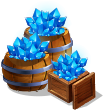Vol.5, Ch.4, P.2
“Walter. You’re ready, or?”
“Right and ready.”
Déu Tsellin—the southern slopes. At their foot were the Reùlingen arrayed in force. And found anear the rearguard were Walter and Erika, the both of them and all their fellow fighters fixed upon the down-frowning mountain. Mighty and immovable it seemed, yet with a nod to Erika’s question, Walter appeared no less a mountain himself, unperturbed by the battle soon to break.
Myriad gazes next looked to him; gazes filled with fire and hope for their hero. But to Erika’s, that hero seemed yet the bumbling, book-loving boy of distant summers past. Thus without reserve, the Reùlingen jarl-daughter reached forth unto the hero-boy’s neck.
“Not looking like that you are,” she quipped as she corrected his crinkled collars.
At once, Walter flustered and faced the other way. “Oh, c-come on,” he groaned. “A tidy collar’s never saved a soldier.”
“But it might a hero,” countered Erika.
Messy raiments reflect the messy heart—a motto by now grown numb to Walter’s ears, habitually heedless of his own looks as he was. And from whose mouth was it so oft repeated but that of the young woman afore him. Oh, not now, of all times, Walter inly complained, growing increasingly uncomfortable as fair and nimble fingers tended to his collars. Smirks and smickers came from all around—not least from Guido and Gunthar, who grinned as they gawked.
“There,” said Erika. “Now you’re right and ready.”
“Th-thanks,” said Walter. Yes, indeed, he did. Uncaring for comb and cloth though he may be, never did the hero forgo a show of gratitude, even were the favour unsought. But in his heart, there burnt now a new ambition: to triumph in this great struggle, and thereby earn from Erika at last the look of an equal rather than a coddler. “Very good. Let’s get this done before supper,” he declared with some steel.
Erika smiled. “That’s the Walter I like to see,” she said.
But even absent such ambition, this battle was one to be won. At all costs. To all sacrifice. This did Walter inly vow as he hardened his countenance and looked back upon the misty mountain. Déu Tsellin—winning it would reward them not only a strategic trove, but a new world.
A world hitherto a fleeting dream. A world wherein fear would find no home; wherein the weak need neither cower nor be cowed. A world brisk and brimming with new friends.
Friends—like Rolf.
Such a world must needs be wrought. Such a world—reached. Together with friend and family, brethren and beloved. Vowing this, too, in his heart, Walter then peered aside. The first light of morrow now flared from the east, gilding the grey mountain mists in glares of gold. And next came into his ears an echoing cry.
“It is time,” a Staffelhaupt announced from yonder. “We march!”
At last: the start of the assault.
Straightway, the former mirth of the fighters faded. Grim now they seemed; actors stepping unto the stage for the final act.
∵
“Herr Rolf. The vanguard—there was contact,” a brave reported to me.
“Very well,” I answered.
The battle had begun… but where and when—much less whether in earnest—I could not guess. Our posterity might place it right at the instant our three forces had set forth. But as is too oft the case, things were not so simple, for rather than begin with a bang, this battle stammered at its start.
No parley was convened; no horn was blown; no command made to attack. Indeed, amidst a mire of fog, friend and foe alike converged in a crawling tide, nearing one another step by uncertain step. And then, here or there would contact be made; hostile faces, figures, and formations emerging out of the mists asudden. Clashes of blades and cries of battle murmured in the distance, but slowly and ever so surely, they crescendoed—to a cackle; to a clamour; to a cacophony.
Caution had been our opening card. It was not to be helped; positionally disadvantaged as we were, tiptoeing unto the fray was all we cared to risk. But from the look of them, it seemed our enemies, too, were no more daring. Curious, that a battle sure to be historic in scale would begin with but a whisper.
But now the mists stirred as swords sang. The braves of the alliance began bustling forth, shoulder-to-shoulder, rousing a great rumble from the earth. Lise and I hurried along with them in their thundering thousands, thudding through the thickening fog, ready at any moment to meet the enemy. But before such could come, I sensed then a certain sound now missing from my ears.
The song of swords—it had ceased.
Deeper into the mists I peered as I ran. It proved little avail, but nonetheless, I understood the sign soon enough: the enemy vanguard were pulling back.
Meaning but one thing…
“Palings!” I cried. “Palings up! Now!”
The whole of our host halted, and our wiċċan wasted no time. A thrum like a waterfall filled the air as they collectively conjured odyl into a defensive spell.
“Hærnwendoþ!” they all cried together. And at once, the fog afore us flashed afire: glaring white it was at first, as phalanxes of palings began sprouting over our vanguard in a glowing wall. But no sooner had those front-fighting braves began bracing themselves than did the fog flare in angry red—and spears of flame pour unto them like bolts from the blue.
The mists brightened. The air boomed. Blinding it was as volleys of the Sċīmæsċ spell bombarded our vanguard. The braves bellowed; explosions blazed in their eyes—but they were all of them unharmed; in the very nick of time had the palings saved their skins.
“Clear the air!” I screamed next. An order utterly terse, I’ll admit, but our wiċċan in all their wit and wisdom understood it well enough.
“Gārfriþ!” came next their concerted incantation, and the spell devised of old to thwart throngs of arrows did so instead to the fog, blowing away the whiteness with a blasting wind. And ever as the fog fled, yonder upon slopes of exposed stone was the culprit uncloaked at last: rank after rank after rank of sorcerers, standing with silverstaves poised upon our ruin.
“Salvators!” I cried. “We face the Salvators!”
To which one brave anear me gave a look most grave. Yet one ought forgive him his fright. The Champions Salvator—a force as famed and ferocious as they were fervent, with resources enough to realise one tactical rarity: the assemblage of sorcerers in staggering numbers. And against whom were their mighty spells now set but us: a host made to fight upon fog and hill.
Not that it would serve any solace to have faced instead another foe. The 1st, the 2nd… had we met either of them here, doubtless our dread would’ve been none the lighter. But such was our lot. And knowing now our enemy, all that remained was to make battle.
“Palings! Again!” I repeated. “Not yet are they done!”
As though to punish my perception, pouring in once more was the Salvators’ volley of searing spears. Fires flashed and shieldings shook—a din of detonations unceasing. Like a scene it seemed from battles bygone: pikes and partisans stabbing ceaselessly away at a cornered defence.
And in witnessing such fury unfold, I guessed next the enemy’s mind. Whereas the Salvators had for themselves a supreme commander in the Marquis Balbreau, we the alliance had none. Yet with such fire did they fight us, as though to win here was to win all the battle itself. And for why but one Man amongst the Nafílim: myself.
War-chief to the Vílungen; traitor to Crown and Country—to strike down so despised a “sicarius” would be a great shadow lifted from Londosius, indeed… with the Salvators’ hands being amongst them the most fain to make the felling stroke. Hence why the Isfälter marquis had curated such a counterassault: whether out of some desire for renown or some sense of responsibility, the lord of this land had seen fit to slay me with his very own men.
A man too much about his own image, perhaps. But in fact, all the better, if so. Sure enough, upon sighting the sheer height of my head and the black blade borne in my hands, the Salvators altogether seethed with anger in their eyes and roused from their throats a collective growl. It would seem they really did have some bone to pick with this rebel.
Fine, then. A bone for the hungry hounds it is—to be delivered by theirs truly.
Decided, I dashed directly to our vanguard, and breaking through the chaos of spell and paling, shot straight into the enemy line.
───────── ∵ ─────────











Comment (0)